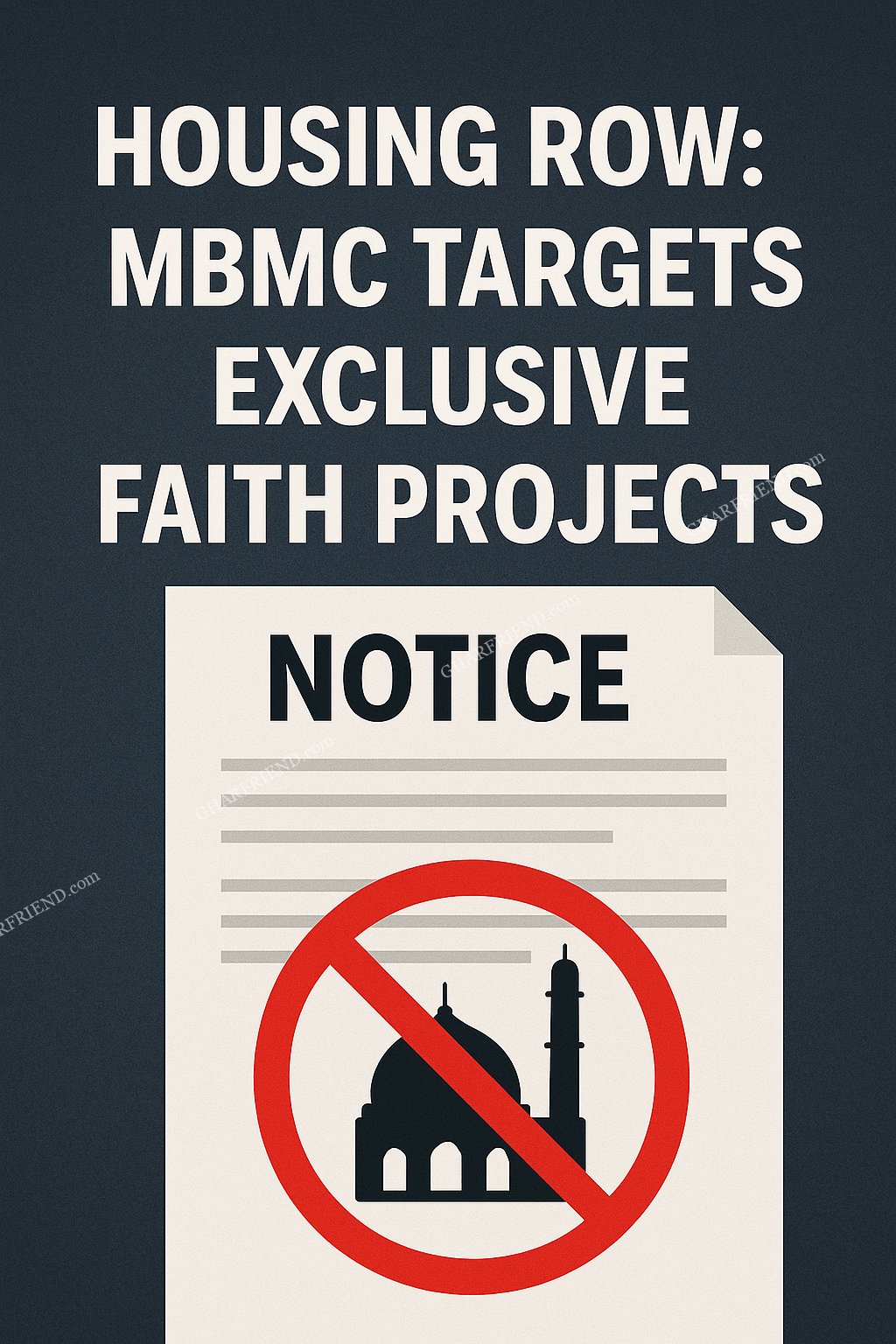Introduction
In September 2025, the Mira Bhayandar Municipal Corporation (MBMC) raised the alarm over certain real estate projects being advertised with religious exclusivity in mind—presented as “Muslim-only” or “Halal lifestyle” housing. Among the builders called out were Leena Group and RR Builders. This has stirred legal debate, political controversy, community reactions, and concerns about how housing is marketed in the future. Republic World
In this blog, we’ll examine:
- What exactly is happening (the facts of the case)
- The legal framework under Indian Constitution & municipal law
- Reactions from different quarters: political, social, affected communities
- Potential repercussions in the real estate market (pricing, developer behavior, buyer trust, regulation) in Mira Bhayandar and similar suburbs
- What this means going forward
What’s the Issue: What Happened
- Notices issued by MBMC: The Municipal Corporation issued notices to two builders in Mira Road (Leena Group and RR Builders) for promoting housing projects via advertisements that seem to target only Muslim buyers or advertise features uniquely relevant to Muslim practices (for example, Qibla-facing apartments). Republic World
- Warning of permissions cancellation: These notices warn that permissions already granted to such projects may be revoked if such advertising continues, or if satisfactory clarifications are not provided. Republic World
- Broader controversy nearby: A related case is the promotional video and marketing of Sukoon Empire, in Karjat, which described itself as a “Halal lifestyle township” with communal prayer spaces, promoting “like-minded families,” etc. This raised concern over segregation, and the National Human Rights Commission (NHRC) has sought reports. Republic World+2The Siasat Daily+2
Legal Basis: What Laws & Constitutional Provisions Apply
Therefore, to understand what MBMC is citing and on what grounds the criticism rests, we must first examine the Indian Constitution. Next, we should consider relevant court precedents, and finally, review the laws related to advertisement and municipal permissions.
Constitutional Provisions
- Article 14 — Equality before law & equal protection of law. States cannot discriminate arbitrarily; classifications must be reasonable, non-arbitrary. Republic World+2HLRN+2
- Article 15 — Prohibits discrimination on grounds of religion (among others). A “religion-based” discrimination in access to housing (or advertising housing exclusively for one religion) can be challenged under this. HLRN+2King Stubb & Kasiva+2
- Possibly Article 21 (Right to Life) which has been interpreted to include the right to dignified living / shelter etc., though housing discrimination cases more often rely on Articles 14 & 15. HLRN+1
Laws, Regulations & Precedents
- There is no specific law in India that is wholly analogous to something like the U.S. “Fair Housing Act,” which explicitly prohibits discrimination in housing sale/rental based on religion, etc. However, Indian courts have often held that discrimination on the grounds of religion, caste etc. in housing is unconstitutional under Articles 14 and 15. King Stubb & Kasiva+2HLRN+2
- Municipal & real estate regulations (permissions, advertising norms) may impose additional restrictions. For example, permissions granted by local municipalities often require compliance with broader constitutional and regulatory requirements (non-discrimination, public order, zoning etc.). The builder permissions given by MBMC can be rescinded if found violating such norms. MBMC in its notice claims such ads are against the Constitution. Republic World
Reactions: Political, Social, Community
- Political voices: Some political actors have criticized the builders, warning against “segregation” or creating “nation within nation” constructs. BJP leaders, MLAs have raised alarms, calling for stricter action. Republic World+2Republic World+2
- Regulatory bodies: The NHRC has stepped in, seeking a report from the Maharashtra government on the issue. The National Commission for Protection of Child Rights (NCPCR) has also flagged concerns. Republic World+1
- Public opinion & community groups: Divided. Some support the idea that minority communities (Muslims in this case) face systemic discrimination in housing; so the demand for “Halal” or religion-oriented housing is seen as a response to that. Others view it as socially divisive, or in conflict with secular and constitutional ideals. The Siasat Daily+2Republic World+2
Market Implications: What This Means for Real Estate in Mira Bhayandar & Similar Areas
- Shift in Advertising / Marketing Norms Builders may be more cautious about how they advertise. Terms like “Halal lifestyle,” “Muslim-only,” or features like Qibla-facing apartments might be toned down, removed, or rephrased to avoid legal trouble.
- Change in Permissions & Municipal Oversight Municipal bodies (like MBMC) may enforce stricter vetting of project advertisements before granting or renewing permissions. Fines, cancellation of permissions may become more common if such religious exclusivity is advertised.
- Buyer Awareness & Trust Potential buyers may become more aware of constitutional rights, may ask developers questions about exclusivity clauses, community restrictions, etc. Could increase due diligence among buyers.
- Pricing & Demand Effects
- Projects that advertise as “religion-exclusive” might appeal strongly to a niche segment; but if legal pressure or social pushback increases, their market may narrow.
- Alternatively, if people feel that mainstream housing options are discriminatory, demand for self-contained, community-centric housing may rise (if marketed in a neutral way).
- Risk of backlash or courts ordering modification of projects, which could affect project timelines and cost.
- Impact on Social Fabric & Urban Planning These controversies bring forth the tension between community preferences vs. secular, inclusive planning. Urban spaces are expected to accommodate religious diversity. Segregated housing can have broader effects on cohesion, integration, shared public resources.
Potential Challenges & Counterpoints
- Freedom of choice argument: Some may argue that communities should have the freedom to live among people of similar beliefs or practices (e.g. cultural/religious preferences). Where does this freedom end when it crosses into discrimination?
- Legitimate religious amenities vs exclusivity: Having prayer areas, spaces for religious practice is fine. The problem is when a housing project explicitly restricts / advertises for one religion only. Differentiating between amenities vs exclusion is crucial.
- Enforcement complexity: Even if the law says discrimination is prohibited, enforcing it in housing is difficult. Monitoring advertisements, clauses in agreements, community norms etc., can be subtle.
What This Means for Mira Bhayandar Specifically
Since this crackdown directly involves builders in Mira Road and Mira Bhayandar, the local market will feel the impact in several ways:
- Closer Scrutiny by MBMC
Projects in this area will now face greater checks from the municipal body. Developers must ensure their marketing, sales materials, and even allotment or membership clauses remain free from discrimination. - Higher Expectations from Buyers
Homebuyers in Mira Bhayandar may increasingly ask for clarity. They will want to confirm that a project is open to all, regardless of religion or caste. As a result, legal and title documents could begin to include explicit non-discrimination clauses. - Shift Toward Inclusive Branding
To reduce legal and reputational risks, developers may move towards more inclusive messaging. Even when projects cater to certain lifestyle preferences, the marketing will likely avoid exclusive religious targeting. - Impact on Property Rates
Property prices could see short-term effects. Developers caught in controversy may face delays, cancellations, or forced changes in project features—such as removing “Qibla-facing” requirements. These issues can raise costs and lower investor confidence.
Conclusion & Looking Forward
The MBMC crackdown on religion-based housing ads is an important moment for real estate in Mira Bhayandar. It clearly signals three things:
- First, housing and property development must follow the constitutional principles of equality and non-discrimination.
- Second, municipal corporations will not only check building permissions but also monitor how projects are advertised.
- Finally, if courts take up these cases, new legal precedents may emerge. These rulings will define how far developers can go in promoting “community lifestyle” projects without crossing constitutional limits.
Impact on Stakeholders
- For Buyers: Always read marketing material carefully. Ask questions and confirm that agreements do not have discriminatory terms.
- For Developers: It is time to revise marketing and sales strategies. Legal checks on advertisements should be built into the process.
- For Policy Makers: Municipal authorities may need to publish clear guidelines. These should help separate permissible community-oriented amenities from illegal discriminatory practices.
In short, this controversy may reshape how housing is marketed in Mira Bhayandar and across Mumbai’s suburbs. The balance between community preferences and constitutional equality will now be under sharper focus.
Huge 1BHK Terrace Flat With Mountain & Creek View
Live in Bhayandar – 3 BHK Pool Villa for the Ultimate Lifestyle






Join The Discussion